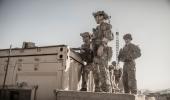Remember the US withdrawal agreement was signed in February 2020.
In the intervening period, a proper evacuation plan ought to have been in place.
It was not.
Consequently, tens of thousands of Afghans who had worked as interpreters, drivers, suppliers of goods and services, etc, face brutal retribution from the Taliban, Virendra Kapoor points out.

Certain things are easy to deduce from America's disgraceful retreat from Afghanistan.
A cowering population fears the return of public executions, lashings and torture, and a sub-human status for women, emblematic of the previous stint by the Islamist extremists.
Barbarism 2.0 is set to return sooner than later to the godforsaken land regardless of what the Taliban might proclaim to sooth the nerves of a stunned world.
40 million Afghans have been ill-served by the self-proclaimed torchbearers of democracy and human rights.
America may not admit defeat, may not be contrite the way innocent Afghans have been left at the mercy of the Islamist jihadis, but it is hard not to compare events playing out on live television in Kabul in the last few days with its equally abrupt withdrawal from Saigon.
That too was a colossal defeat for the US at the height of the Cold War.
America lived down that rebuff, no doubt helped enormously by the subsequent collapse of the rival great power.
In the new global order that emerged after the fall of Soviet Union it found itself to be the sole superpower.
But the geopolitical scene is totally different now than it was in 1975 when America withdrew from Vietnam.
America was ascendant then. Now it is a declining power, though still ahead of a rising China.
However, the 20-year misadventure in Afghanistan, which cost it nearly 3,000 military lives and over two trillion dollars, is bound to erode its global influence and call into question its fidelity to universal ideals.
Clearly, an inward looking America now thinks nothing of forsaking friends and allies.
Needless to say, the American foreign policy lies in tatters, its pieces strewn all over in the streets of Kabul, Baghdad, Damascus, et al.
Taliban guerrillas roam the Kabul streets on American Humvees with shoulder-propelled rocket-launchers dangling menacingly, terrorising the local populace.
It will be hard for the Biden administration to pick up these pieces and try and make some of sense of what passes for a rational policy, especially when he refuses to concede that the necessary spadework before withdrawal was not done to avoid the precipitate collapse of the puppet Ashraf Ghani regime.
Remember the withdrawal agreement was signed in February 2020.
In the intervening period, a proper evacuation plan ought to have been in place.
It was not. Consequently, tens of thousands of Afghans who had worked as interpreters, drivers, suppliers of goods and services, etc, face brutal retribution from the Islamists.
Unlike last time when the Taliban ruled three-fourths of Afghanistan from 1996 to 2001, they now count China, Russia and Iran in their corner, though curiously Russia was a party to the UN resolution branding the Taliban a terrorist organization.
Pakistan then double-crossed America not-so-covertly.
Now it does so openly, providing strategic inputs and sheltering the Taliban brass while pocketing American billions for the use of its land and air space for keeping the supply lines of the US-led NATO troops open.
Of course, it is too early to say whether the Taliban will be able to restore a semblance of order in the entire country.
To begin with, they are not a cohesive force, submitting themselves to the will of a superior leader.
Nor are Afghans a homogenous people. Other ethnic groups such as the Hazaras, who are mostly Shias, Tajiks, Balochs, Uzbeks, etc, are certain to challenge the Pashtun-dominated Taliban's writ.
Already, signs of resistance can be seen in opposition to the replacement of the black, red and green Afghan national flag with the insurgents' white flag.
Besides, the effort to revive the Northern Alliance, last headed by the powerful warlord Ahmned Shah Massoud, who was killed two days before the 9/11 attack on the Twin Towers, are already visible, with vice-president in the Ghani government, Amanullah Saleh, claiming to rule the country.
Also, slain leader Ahmad Shah Massoud's son has undertaken to group together anti-Taliban mujhaideen to challenge their writ, especially in the Panjshir Valley.

India has every reason to be concerned about the return of the Taliban.
The fact is the Islamists' inherent hostility towards India remains undiminished, stemming as it does from a deeply anti-Hindu mindset.
With China, Russia and Iran prepared to accommodate the motley band of religious guerrillas, the danger of Pakistan using Afghan soil to launch terrorist attacks in Kashmir has certainly increased.
Already, Pak-based anti-India outfits like Jaish-e-Mohammad and Lashkar-e-Tayiba are eyeing recruiting Afghan jihadis rendered jobless by America's exit.
Evidence of what lies in store for India was available when the Taliban made it very hard for the Indian mission staff in Kabul to reach the airport. New Delhi had to seek the Americans' and other help to do so.
Also, the Taliban raided and searched the Indian consulates in Kandhar and Herat.
It is not hard not to see the hand of the Taliban's puppet-master in the Pakistan army's Rawalpindi GHQ.
These are early signs of things to come. So, it is foolhardy to play down the threat from Taliban-controlled Afghanistan.
There is yet another factor India cannot afford to ignore.
The US has frozen Afghan central bank assets totaling about ten billion dollars.
The IMF too has stopped all lending. So have a number of Western nations. With Pakistan already in dire financial straits, it is in no position to lend money.
In such a scenario, China can be expected to rescue the Taliban in exchange for the right to exploit its natural resources -- and the self-styled Islamic warriors would willingly do business with China which is leaving no stone unturned to wipe out the traces of Islam from its soil.
India had little leverage when the corrupt regime led by Ashraf Ghani was ensconced in Kabul, despite its three billion dollar spending on commendable development works.
It has none now. Caught in a cul-de-sac, India has to negotiate the abrupt change to the best of its strategic and security capabilities.
Inward-looking Americans may feel they no longer have much at stake in Afghanistan, but for India the threat perception has only increased.
Notice the public pronouncements of senior Taliban figures, including those who had trained at the Indian Military Academy in Dehradun in the 1970s and 1980s. They are spewing venom against India.
Meanwhile, watch for signs of an internal power struggle in the ongoing government formation process in Kabul.
The Taliban will continue to remain in the news for all the barbaric things it is known to do, for a leopard does not change its spots.
Besides, if the Taliban embrace moderation, they stand to lose the sole reason which helps them suppress ordinary Afghans.
Fear of the sword, public hangings, stoning of women is key to the rise of the Taliban.
Feature Presentation: Aslam Hunani/Rediff.com











 © 2025
© 2025